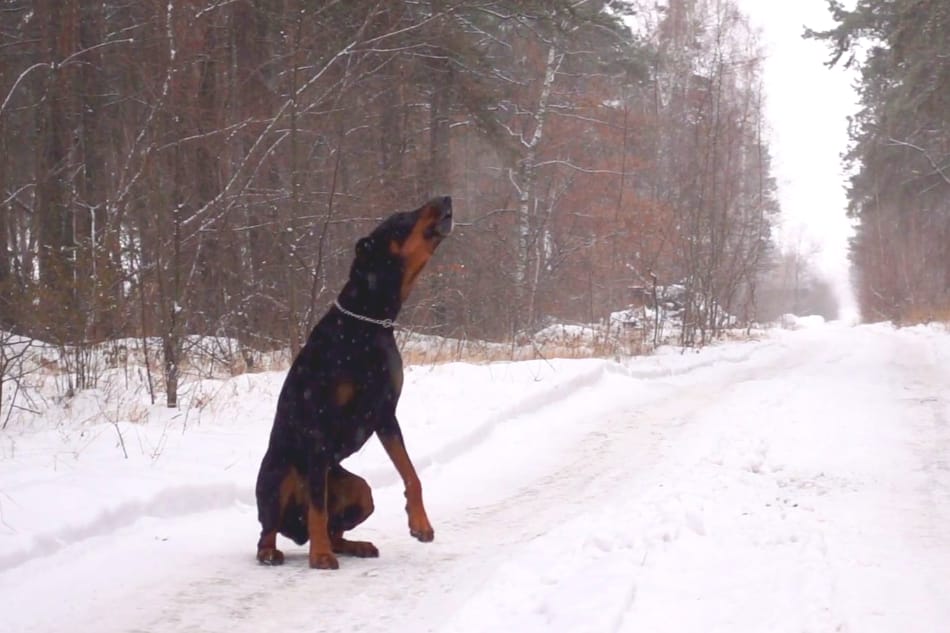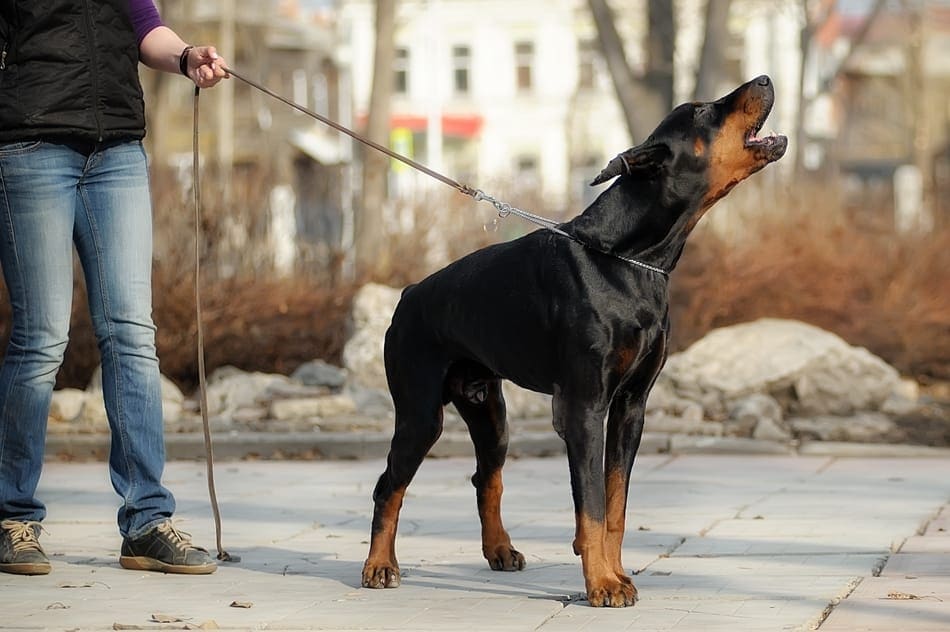
Our Doberman Cooper was still a puppy when he first demonstrated his talent for howling. As he got older, he can still certainly let out an impressive howl but luckily, like most Dobermans, he doesn’t howel unless something is seriously wrong. Howling is a behavior I didn’t expect when I first got a Doberman but now that I’m deep in the Doberman world, I have learned that these dogs certainly do howl, and usually, they do it for a specific reason.
While studying for my Canine Communication Certification, I quickly realized that there is certainly a multitude of reasons dogs use howling as a means of communication. However, there are certain reasons why Dobermans specifically are more likely to howl over other dog breeds.
These are the most common reasons why Dobermans will howl, and how often is normal for a Doberman to howl.
Why Dobermans Howl
Doberman puppies usually make their first attempts to howl when they’re around six to eight weeks old. By around eight months of age, they’ll likely be experts at it—even if they don’t use it all that often.
When they’re that young, their howls are mostly a combination of practicing the vocalization and trying to get their mother’s attention. When they get older, though, their communication abilities expand and so do the reasons why they might be howling. Here are some of the most common reasons Dobermans howl.
1. Loneliness or Separation Anxiety
Probably derived from the practice of howling to get mother’s attention when a puppy, some grown Dobermans will howl if they’re experiencing increased stress due to being bored, left alone, or if they’re separated from their owner or pack.
Interestingly, this 2001 study found that dogs who live in urban settings such as apartments—where, unfortunately, howling can be more disruptive for neighbors—are more prone to separation anxiety.
Separation anxiety is very common in Dobermans and probably the most common trigger of howling for this breed. It can usually be diagnosed easily since it tends to be accompanied by other signs of anxiety, such as pacing, going to the bathroom indoors, overeating or undereating, and destructive chewing or digging all focused around the departure of their owner (or member of their “pack”). It’ll also usually come on around the time their owner is preparing to leave the house, or after they have already left. Learn more about how to spot (and correct) separation anxiety in Dobermans here.

2. Responding to Other Sounds
Some Dobermans will howl in response to a trigger sound, like an alarm, doorbell, siren, certain types of music, or even their owner’s making howling noises. Dobermans who do this seem to be particularly sensitive to high pitched noises. The science isn’t really settled on precisely why they do this, though it may be related to both the desire to find the pack or the urge to ward off the perceived intruder away from the dog’s territory. Or simply, they could just be singing along!
This is fairly common in Dobermans who are left outdoors and hear an emergency siren, for example, in the distance and coming closer.
3. Illness or Injury
Dogs who are sick or hurt in some way that is not immediately visible will often howl more than usual in order to alert their pack (or owner) that something is wrong.
It’s a good idea to familiarize yourself with your Doberman’s usual howling habits—their triggers, how long they usually howl, what time of day they tend to do it, and so forth—so you can be more likely to pick up on a howl that might indicate illness or injury of some kind.
Typical behavior for a Doberman is to seek out their owner when they’re injured but if they are trapped, or unable to reach their owner, they may resort to howling. This type of howling is rare, but when it occurs owners should definitely take notice.
4. Sounding the Alarm
A good, hearty howl can serve Dobermans as a way of warning other dogs to keep their distance. Most dogs, including Dobermans, will use a howl to indicate to other dogs that they’re claiming a particular territory for themselves. Sometimes, Dobermans will give a defensive howl if they hear a surprising or unexpected sound, which seems to be a way of alerting other members of the pack about the potential danger.
Although it’s much less common than just using a deep strong bark, some Doberman owners report that their dog will howl when they are alerting to the presence of a trespasser on their property.
5. Getting in Touch With the Pack
Like wolves, with whom they share a common ancestor, Dobermans usually howl as a way of letting other members of their pack (which, in most cases, means their owner and family) know where they are. When they hear other dogs howling, they might also reply as a way of confirming that they’re there and listening.
How Much Does a Typical Doberman Howl?
Most Dobermans don’t howl on a daily basis and do not have problems with excessive howling. Although each dog is an individual with their own tendencies, in general, very few Doberman owners report excessive howling issues. In fact, a majority of owners report no howling from their dogs whatsoever.
Since Dobermans are a particularly human-dependent breed, when they do howl, it’s usually a sign that they want to be with their people. Usually, this is spurred on because the dog is experiencing separation anxiety, something that is very common in Dobermans.
Also, most likely due to similarity in frequency and tone, Dobermans are also prone to howling at the sound of sirens.
How Loud Is a Doberman Howl?
A Doberman’s howl is fairly throaty and gruff in comparison to many other breeds. However, they can certainly carry the tone and make it long and drawn out.
The adult Doberman has a very deep chest, which gives it a large resonance chamber, and they have strong protective instincts, which means there can be a propensity for powerful barking from a Doberman in many circumstances. They’re certainly capable of an attention-commanding howl that can easily be heard through walls, closed windows, or across the street. Their howl will definitely catch the attention of your neighbors.
Like most dogs, it starts off rather quiet when the dog is a puppy and peaks at around three years of age. Their howl will remain strong until the dog enters older age, at around eight years old, at which point the strength of the howl typically tapers off a bit.
Doberman Howling as Compared to Other Breeds
While the Doberman has a powerful howl, it’s not the loudest or most frequent howler. A number of other breeds are well-known for their frequent howling abilities including:
- Huskies
- German Shepherds
- Hound Breeds
- Beagle
These super-howlers share the closest genetic links with wolves or they’ve been specifically bred over generations to be communicative.
Dog Express, and many other outlets, rank the Doberman among the top 10 loudest breeds of dogs in the world based on the capability to be loud, and not their desire. Luckily for us Doberman owners, these dogs are easily trainable and although they have the capability to be loud howlers, you generally need to worry more about their bark.
Barking is far more likely to be an issue with a Doberman than howling, learn more about how often you can expect a Doberman to bark here and when you’re ready to resolve the barking for good, my article 6 Steps to Get Your Doberman Pinscher to Stop Barking will get you to a quieter dog quickly.
Howling When Home Alone
Since they have a powerful pack mentality, and always want to be close to their owners, Dobermans are especially prone to howl when left alone or when separated from their family.
If you keep your Doberman outside at night while the rest of the family sleeps inside, you should expect to hear from your dog—and from your neighbors. But it doesn’t just happen at night. Dobermans have been known to howl for their family when they’re gone for a while—such as when they leave for work for the day—or even just briefly out of their sight in some cases.
This kind of howling is not a cause for concern unless it recurs consistently. Be especially alert for additional symptoms of stress, such as destroying things or changes in appetite. Combined with constant howling, these can indicate an underlying emotional condition, such as depression or anxiety, that may require additional intervention.
If you’re struggling with this in your Doberman, I have an article all about handling needy Dobermans with separation anxiety here which will resolve these issues.
How to Stop a Doberman from Howling
In most cases, the easiest way to stop a Doberman from howling is to remove the stimulus that triggered the behavior. If they’re lonely, keep them company. If there is a noise that is setting them off, find a way to block or turn off the noise. Sounds simple, and it is, but it’s just the first step.
If your dog’s trigger recurs often or if you don’t have the ability to prevent your dog from hearing it, you’ll want to start using a desensitization and counterconditioning training regimen so your dog will learn to ignore the trigger.
This kind of training involves conditioning your dog to gradually substitute an alternative, less problematic behavior, such as fetching a toy or going into his crate or bed. If you’re not comfortable tackling the training yourself, look for a behaviorist or dog trainer to assist you in developing a personalized plan.
You can also try silence reward training: this is a more straightforward practice in which you give a silence command (such as “be quiet”) and when the dog stops howling reward your dog right away. Over time, your dog will learn that he gets a treat or attention when he doesn’t howl, and he will learn to obey the silence command as well. My Doberman training page will give you the keys to quickly training your Doberman in many different commands and behaviors.

The Difference Between Whining and Howling
Be attentive to the difference between howling and whining (or whimpering) in your Doberman because these have different meanings. Howls are much louder and typically involve an upturned head; when a dog whines, it’s quieter and the dog often cowers while doing it. Whining is typically a signal of fear, anticipation, excitement, or simply a display of begging.
If your Doberman is whining out of fear, give him some space and try to resolve the trigger of their fear. It’s best never to approach a scared dog. If your Doberman is whining because he’s begging for something, its best to ignore the behavior and not reward it with attention. Otherwise, you can expect the dog to whine even more in the future when he wants something.
Be aware, however, that Dobermans will sometimes whine, rather than howl, if they’re injured or ill and lack the energy to give a full-throated howl. If your Doberman doesn’t usually whine and he starts randomly, particularly if the whining is consistent and accompanied by lethargy, contact your veterinarian.
Final Thoughts
Lucky for us Doberman owners, these dogs don’t generally have issues with excessive howling like other breeds will. For us, dealing with unwanted barking is usually a much larger hurdle.
But knowing what to expect from a Doberman before choosing to bring one home is incredibly important and so is being prepared for other behaviors you might not be expecting.
If you Doberman is howling excessively though, I’m willing to bet that it’s related to separation anxiety as this is something that Dobermans consistently struggle with. If you believe that may be the case for your Doberman, I usually suggest addressing separation anxiety with a good desensitization routine.
Related Questions
Why do Dobermans whine? Dobermans typically whine due to excitement, anxiety, frustration, or fear. Examples of times when a Doberman will whine include when they are injured, bored, lonely, or anticipating something exciting, like a meal or treat.


